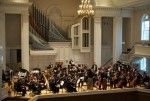Tchaikovsky’s 1812 Overture

Peter Ilyich Tchaikovsky’s 1812 Overture, an epic composition about Napoleon’s failed military incursion into Russia that is often confusingly played at American Pops concerts on the Fourth of July, famously climaxes with actual cannon fire.
“Tchaikovsky didn’t write a part for the chapel’s fire alarm system,” Professor of Music and Conductor of the Colgate University Orchestra Marietta Cheng apologized at the Uni-versity Orchestra’s 1812 Spring Concert on Sunday, explaining why a computerized cannon would replace actual cannons for this performance.
The University Orchestra held their spring concert on Sunday. The concert was titled “1812″ and included performances of compositions by Sergei Proko-fiev, Dmitri Shostakovich, Ed-ouard Lalo, C?ecille Chaminade, Camille Saint-Sa?ns and, of course, Tchaikovsky.
Marches done in markedly different styles ran throughout the program, from the bombastic, frantic march in Prokofiev’s The Love of Three Oranges to the elegant, stately procession in the “Kiej’s Wedding” segment of Prokofiev’s Lieutenant Kiej Suite. Russian and French composers dueled with one another with Russian composers Prokofiev and Shostakovich dominating the first half of the program and French composers Chaminade and Saint-Sa?ns taking the second half. Tchaikovsky’s 1812 Over-ture, depicting this nationalistic strife with its invocations of the French anthem “La Marseilles” and the Russian anthem “God Save the Czar,” introduced and concluded the program with a fanfare at the beginning and the full overture to close. It did certainly close the program with roaring computerized cannon blaring through a subwoofer and chiming bells.
The concert was also dis-tinguished by three solo per-formances from the three winners of the Concerto Com-petition. Senior Myung-Jin Lee led Shostakovich’s Cello Concerto No. 1. Lee executed the cello part on Shostakovich’s concerto with remarkable, taut precision and timing that brought out its star-tlingly, irregular rhythms. In fine contrast to this performance, senior Annette Shantur played with a light, mellifluous grace on Lalo’s lush Symphonie Espag-nole. Senior Sarah Gerd, as the final soloist, played Chaminade’s Concertino in D with its rippling motifs for flute in a pure, unified performance that led up to the piece’s quiet but dramatic conclusion where the flautist flies off magnificently into a few passionate strains.
“1812,” wonderfully conducted and creatively arranged by Cheng, had its thunder of timpani, tuba, bells and, of course, computerized cannons, but, like Tchaikosky’s tone poem, also had very fine and graceful melody.
Contact Thomas Wiley at [email protected].






